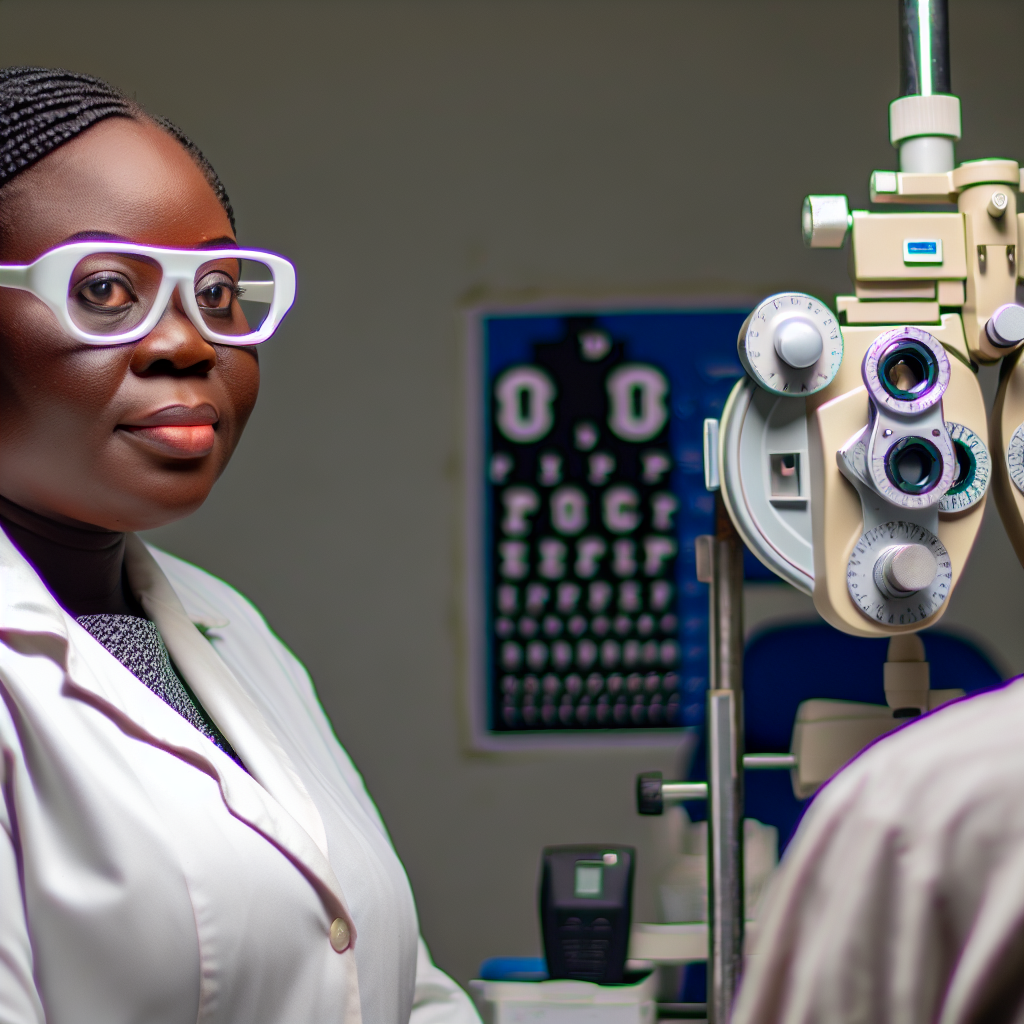Introduction to Optometry in Nigeria
Optometry plays a crucial role in Nigeria’s health sector.
Professionals in this field provide essential eye care services.
These services address vision problems and various eye conditions.
Furthermore, they contribute to public health by preventing blindness.
Significance of Optometry
Eye health significantly impacts overall health and quality of life.
Access to optometric care reduces the risk of vision impairment.
Additionally, optometrists educate the public about eye care.
This education promotes awareness of common eye diseases.
Role in Disease Prevention
Optometrists in Nigeria conduct routine eye examinations.
These examinations help detect refractive errors early.
They also screen for conditions like glaucoma and cataracts.
Consequently, timely interventions can be implemented to prevent complications.
Collaboration with Other Health Professionals
Optometrists often work alongside other healthcare providers.
This collaboration enhances the overall health service delivery.
For instance, they refer patients to ophthalmologists when necessary.
Moreover, they participate in public health initiatives and campaigns.
Impact on Community Eye Health
Optometrists lead community outreach programs on eye health.
These programs aim to provide services to underserved populations.
They conduct free eye screenings in rural communities.
Through these efforts, they significantly improve access to eye care.
The Educational Pathways and Training Programs for Optometrists in Nigeria
Optometry education in Nigeria plays a crucial role in developing eye care professionals.
It combines theoretical knowledge with practical skills to prepare graduates for the field.
The programs emphasize the importance of vision care in public health.
Undergraduate Programs
Undergraduate programs in optometry typically last five years.
Students earn a Bachelor of Optometry degree upon completion.
The curriculum covers essential topics such as ocular anatomy and optics.
Students also gain experience in clinical settings through supervised practice.
Postgraduate Training
Postgraduate education offers advanced knowledge and specialization.
Programs include Master’s degrees and residencies in specific areas of optometry.
Specializations may focus on topics like pediatric optometry or ocular disease.
This training enhances skills and prepares optometrists for complex cases.
Accreditation and Professional Standards
Optometry training programs must meet accreditation standards set by relevant bodies.
In Nigeria, the Optometrists and Dispensing Opticians Registration Board oversees this process.
Compliance ensures that graduates are equipped to practice competently.
Professional training includes ethics and patient care guidelines.
Continuing Professional Development
Optometrists engage in continuing education to maintain their licenses.
Workshops, seminars, and conferences provide ongoing learning opportunities.
This development helps optometrists stay updated on advancements in the field.
Furthermore, it fosters collaboration between professionals and institutions.
Impact on Community Health
Training programs emphasize the role of optometrists in community health initiatives.
Graduates engage in awareness campaigns about eye health and prevention of diseases.
They also provide services to underserved populations in rural areas.
This effort significantly improves access to eye care in Nigeria.
Roles of Optometrists in Nigeria’s Healthcare System
Optometrists in Primary Healthcare Settings
Optometrists play a vital role in primary healthcare in Nigeria.
They provide essential eye care services to local communities.
Additionally, they conduct comprehensive eye examinations.
Early detection of visual impairments is a key focus.
Moreover, they prescribe corrective lenses to enhance vision.
Optometrists also educate patients about eye health.
They promote awareness of common eye diseases.
Furthermore, they offer preventative care to reduce eye health issues.
Optometrists in Secondary Healthcare Settings
In secondary healthcare, optometrists work alongside other healthcare providers.
They aid in managing complex eye conditions.
This includes diseases such as glaucoma and diabetic retinopathy.
Additionally, they collaborate with ophthalmologists for surgical referrals.
Optometrists often assist in post-operative care and monitoring.
They ensure continuity of care for patients post-surgery.
Furthermore, they participate in integrated health programs.
Such initiatives enhance overall health outcomes in communities.
Optometrists in Tertiary Healthcare Settings
Within tertiary healthcare, optometrists engage in advanced diagnostic procedures.
They utilize specialized equipment for detailed eye assessments.
Moreover, they conduct research to advance optometric practices.
Optometrists contribute to the education of future eye care professionals.
This involves training interns and residents in clinical settings.
They also play a significant role in public health initiatives.
Their expertise is crucial in tackling public health challenges.
Optometrists are essential to Nigeria’s healthcare landscape.
See Related Content: How to Become a Medical Lab Scientist in Nigeria: Key Steps
Collaboration between Optometrists and Other Healthcare Professionals
Interdisciplinary Teamwork
Optometrists play a vital role in interdisciplinary healthcare teams.
They collaborate with various professionals to enhance patient care.
This teamwork improves diagnosis and management of ocular conditions.
Importantly, they work closely with general practitioners and specialists.
These collaborations often lead to better health outcomes for patients.
Shared Patient Education
Optometrists contribute significantly to patient education initiatives.
They educate patients about eye health and preventive care.
By sharing information, they help other healthcare providers raise awareness.
This approach enhances patient compliance and awareness regarding eye issues.
Consequently, patients become more proactive about their eye care needs.
Referral Networks
Effective referral networks strengthen the healthcare system.
Optometrists often refer patients to specialists when needed.
These specialists may include ophthalmologists or general physicians.
In turn, they receive referrals for patients requiring ocular assessments.
This system ensures comprehensive care is provided to patients.
Telehealth Collaborations
Telehealth has emerged as a valuable tool in healthcare delivery.
Optometrists utilize telehealth to reach underserved populations.
This technology allows for remote assessments and consultations.
Collaboration via telehealth broadens access to eye care services.
Publish Your Professional Profile, Business or Brand
Showcase your expertise, gain trust, and boost visibility instantly on Professions.ng.
Publish NowFurthermore, it enhances communication between healthcare professionals.
Community Health Initiatives
Optometrists actively participate in community health programs.
They offer vision screening services in collaboration with health clinics.
These initiatives aim to identify and address visual impairments.
In doing so, they improve overall community health standards.
Additionally, these events raise awareness about the importance of eye care.
You Might Also Like: Why Nursing is One of the Most Rewarding Careers in Nigeria
Challenges Faced by Optometrists in Nigeria’s Health Sector
Limited Access to Training and Resources
Optometrists in Nigeria often face a scarcity of advanced training opportunities.
This limitation hampers their ability to stay updated with global practices.
Moreover, access to essential resources is frequently inadequate.
Many clinical settings lack modern equipment for effective eye care.
Consequently, patients may not receive optimal diagnostic or treatment options.
Regulatory and Policy Obstacles
The legal framework governing optometry in Nigeria presents significant challenges.
Many optometrists encounter difficulties in navigating the regulatory landscape.
Obtaining necessary licenses can be a lengthy and complicated process.
Additionally, inconsistent policies often create uncertainty in practice standards.
As a result, this affects the professionalism and credibility of the field.
Public Awareness and Education Gaps
Public understanding of eye health and optometric care is limited in Nigeria.
Many individuals do not recognize the importance of regular eye examinations.
This lack of awareness leads to late presentation of eye conditions.
Consequently, some treatable issues worsen and can lead to blindness.
Optometrists strive to educate the public, but further efforts are necessary.
Economic Challenges
The economic landscape significantly impacts optometric practice in Nigeria.
Many patients lack the financial resources to seek eye care services.
Optometrists face difficulties in collecting payments for their services.
This situation creates a barrier to providing necessary care to patients.
Moreover, the high cost of essential equipment further complicates practice.
Workforce Distribution Issues
There is an unequal distribution of optometrists across Nigeria.
Urban areas generally have better access to optometric services than rural areas.
This disparity leaves many rural populations underserved.
Addressing this issue is crucial for achieving equitable health outcomes.
Efforts are required to encourage optometrists to work in these underserved areas.
Find Out More: Everything You Need to Know About Becoming a Radiographer in Nigeria

Impact of Optometry on Public Health and Community Eye Care Initiatives
Significance of Eye Health
Eye health plays a crucial role in overall public health.
It affects education, employment, and quality of life.
In Nigeria, visual impairment remains a significant public health issue.
This condition can hinder economic development and social interaction.
Optometrists’ Contributions
Optometrists are essential in addressing eye health needs.
They provide vision care services across various communities.
This includes vision screening, diagnosis, and treatment of eye disorders.
Moreover, they educate the public about eye care practices.
Such initiatives improve community awareness and prevent complications.
Community Eye Care Programs
Various community eye care programs exist in Nigeria.
These programs aim to increase access to eye health services.
Collaborations between optometrists and local health organizations are vital.
Programs often include mobile clinics to reach underserved areas.
Additionally, public health campaigns raise awareness about eye health.
Challenges in Optometry Practice
Despite their contributions, optometrists face challenges in Nigeria.
Limited resources and financial constraints hinder service delivery.
Moreover, there is often a lack of public awareness about eye care.
Addressing these challenges requires strong advocacy and support.
Future Directions for Optometrists
The future of eye care in Nigeria depends on effective collaborations.
Optometrists should partner with government and NGOs for resource mobilization.
They must also engage in continuous professional development.
This will enhance their skills and knowledge in managing eye health issues.
Ultimately, improving eye care services will benefit the entire community.
Find Out More: Must-Know Healthcare Professions Thriving in Nigeria
Technological Advancements in Optometry
Impact on Patient Care
Technological advancements have transformed optometry in Nigeria.
New tools enhance diagnostic accuracy for eye conditions.
This leads to early detection and timely treatment options.
Moreover, advanced imaging technology provides detailed insights.
Patients benefit from personalized treatment plans based on accurate data.
Tele-optometry and Accessibility
Tele-optometry has emerged as a vital service in Nigeria.
It allows patients to access eye care remotely.
For instance, patients in rural areas can consult specialists online.
This service improves access for those with limited mobility.
Additionally, it reduces the need for travel, saving time and expenses.
Innovative Treatment Solutions
Technological innovations offer new treatment options for patients.
For example, advanced contact lenses now correct a variety of vision issues.
Furthermore, laser treatments have become more precise and safer.
These solutions respond effectively to individual patient needs.
Patients experience faster recovery times and improved satisfaction.
Data Management and Patient Records
Digital records streamline patient management in optometry clinics.
Optometrists can track patient history and treatment progress efficiently.
This leads to better follow-up care and increased patient engagement.
Moreover, data analytics can identify trends in vision health.
This information helps inform public health initiatives across Nigeria.
Future Prospects and Developments for Optometry in Nigeria’s Health System
Expanding Access to Eye Care Services
The demand for eye care services in Nigeria is increasing significantly.
Optometrists can play a crucial role in meeting this demand.
Community-based eye care programs will help bridge the gap.
Mobile clinics will extend services to remote areas.
Partnerships with local organizations can enhance service delivery.
Advancements in Technology
Technological innovations are transforming optometry in Nigeria.
Telemedicine allows optometrists to reach patients in distant locations.
Modern diagnostic equipment improves accuracy in eye examinations.
Training programs will enable optometrists to utilize new technologies effectively.
Education and Professional Development
Enhanced education and training opportunities will benefit optometrists.
Publish Your Professional Profile, Business or Brand
Showcase your expertise, gain trust, and boost visibility instantly on Professions.ng.
Publish NowCollaboration with universities can develop specialized programs.
Continued professional development is essential for skill enhancement.
Workshops and conferences provide valuable networking opportunities.
Strengthening Policy and Regulation
Advocating for supportive policies will strengthen optometry in Nigeria.
Professional regulations ensure the delivery of high-quality eye care.
Involvement in policy-making can give optometrists a voice.
Establishing a regulatory framework is vital for the profession’s growth.
Increasing Public Awareness
Public awareness campaigns can educate communities on eye health.
Information on the importance of regular eye checks will be shared.
Collaboration with media can amplify these messages effectively.
Engaging schools in eye health education will reach younger populations.
Collaboration with Other Health Professionals
Working alongside other health care professionals can strengthen eye care services.
Interdisciplinary teams can address broader health issues effectively.
Training in collaborative practice will enhance overall patient care.
Such partnerships can lead to integrated health care systems.
Additional Resources
Factors influencing the decision of Nigerian optometry students to …
Optometrists & Dispensing Opticians Registration Board of Nigeria




